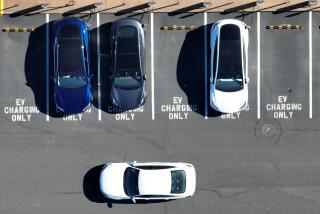Doing only what’s needed to keep vehicles on the road
- Share via
L.A. social worker Cathie Capp knew her teenage son’s 1992 Toyota pickup needed work. Whether she could afford the $1,500 repair bill was another matter.
“The cost of food and gas is affecting me like everyone else, so I’m going with the Band- Aid,” said Capp, who opted to forgo the full engine repair job in hopes that a $415 quick fix would do the trick -- for now, at least.
“I’m hoping and praying it gets him through his first year of college,” she said.
Pay me now or pay me later, the mechanic in the Fram oil filter ads used to say. Like Capp, many car owners are choosing the latter course these days.
Budget-minded vehicle owners are increasingly delaying maintenance on their cars and light trucks, industry experts report. They’re driving longer between oil changes, putting off scheduled part replacements and opting for minor “make do” repairs when more extensive -- and expensive -- work is called for.
“People would rather eat than buy a muffler,” said Jim Lang, whose New Jersey firm, Lang Marketing Resources Inc., tracks the market for auto parts and accessories, which had sales of $210 billion in the U.S. last year.
“If they don’t have to buy something for their vehicle, they won’t,” Lang said. “And if they do have to, they’ll do it in the most economical way.”
In the Los Angeles area, independent repair shops and dealership service departments are seeing the same trend. Some of that business is going to the Internet, where do-it-yourselfers are increasingly shopping for oil filters, wiper blades and other parts. But frugal car owners who aren’t so mechanically inclined are more likely to make do with less, or do without.
“For example, they’ll get an oil change but not get the tires rotated,” said Alex Tamez, director of operations at Star Ford in Glendale. “The economy and gas prices have a lot to do with it.”
The decline in service work is showing up in the profit reports of auto supply retailers. O’Reilly Automotive Inc. last week reported a 4% drop in first-quarter earnings. Chief Executive Greg Henslee told analysts that “our customers are having to make tough decisions about vehicle maintenance and repairs” and many “are doing the bare minimum to keep their vehicles roadworthy.”
That worries safety experts, who warn that failing to do regular maintenance can be hazardous. Engine belts and hoses, for example, last longer than they did 30 years ago. But they also don’t show wear as readily, meaning they should be checked regularly by a trained mechanic, said David Skaien, an auto repair expert with the Automobile Club of Southern California.
“If you’re on the 405 in rush-hour traffic and you break a belt or hose, you have a problem,” Skaien said.
James Diggs, who runs a business out of his Pasadena home, said he doesn’t neglect safety-related problems with his 1999 Toyota Camry. But with inflation taking a bigger bite out of his wallet, he puts off auto work as long as he can.
“Every time you go to the grocery store, it’s right in your face,” Diggs said. “And the price of gas is killing us.”
Jon Smalldridge, who runs Accurate Autoworks in Pasadena, said the “pay now or pay later” warning isn’t just hype to drum up repair business. He said some of his customers were delaying such jobs as replacing their car’s timing belt, a crucial component that can ruin an engine if it breaks. (The replacement schedule varies depending on the type of car.)
“Instead of getting it changed at, say, 95,000 miles, I’m seeing people push it out to 115,000 or 120,000 miles,” Smalldridge said.
Changing a timing belt can cost $500 or more -- a tough sell in tough times. But rebuilding an engine can cost thousands of dollars if the gamble fails.
“It’s the classic penny-wise, pound-foolish scenario,” the Auto Club’s Skaien said.
Fortunately for owners who are delaying maintenance longer, experts note that modern vehicles are designed and built to last longer and perform more reliably. Higher-quality motor oils mean owners may not have to stick to the traditional 3,000-mile oil change regimen, and electronic ignition systems enable owners to go longer between engine tuneups. (The average AAA member spends close to $700 a year on car repairs and maintenance, according to the group.)
But bad economic times mean people hold on to their cars longer -- sales of new cars and light trucks are down 8% this year -- and older cars typically need more preventive maintenance.
Even something as simple as keeping tires properly inflated -- an easy chore that most car owners nevertheless fail to do on their own -- can reduce fuel economy.
“If you’re going to keep your car longer, you need to be ahead of the curve on maintenance, not behind the curve,” Skaien said.
--






